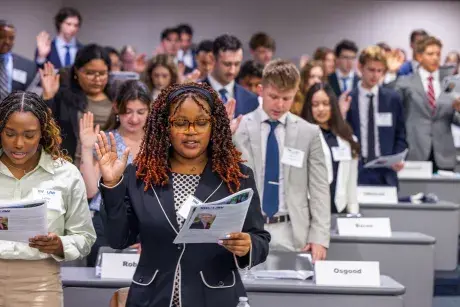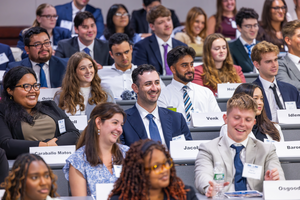A New Class of Changemakers
Record-breaking Class of 2028 begins legal education

The Roger Williams University School of Law Class of 2028 arrived in Bristol for orientation on August 13, 2025. Already the new class has made a big impact on campus.
At 191 students, the incoming class is 15% larger than last fall’s new class. The number of accepted students who enrolled also jumped from around 23% in 2024 to 31%. This is the first time since the American Bar Association began collecting this data in 2011 that the acceptance rate has been over 30%.
“The Class of 2028 is exceptional,” says Dean Gregory Bowman. “In its size, academic credentials, and life experiences, our incoming class will certainly leave a positive and lasting influence on RWU Law and on the legal profession.”
LSAT scores for first-year students are up across the board and undergraduate grade-point averages continue to be at record highs. The top quartile earned an average 3.73 GPA at their 121 undergraduate institutions. That is a 30 year high.
Drawing students with authenticity
The high numbers of applications and competitive applicant pool reflect national trends. According to data from the Law School Admissions Council, the number of applicants for 2025-26 nationally rose around 18% from the prior year.
“We knew it was going to be a busy admission cycle,” notes Assistant Dean of Admissions Kate Vieira L’12. “The national trends from almost the very beginning of the year last August seemed like they were telling a consistent story.”
As Vieira and her team reached out to prospective students virtually and in-person, they emphasized the school’s mission of preparing students for success and promoting social justice. “When we are talking to prospects and applicants and they saw that authenticity come through from us as representatives of the school. It helped to shed light on what the school is like,” she says.
Numbers reflect holistic approach
Students in the Class of 2028 come from a range of backgrounds and experience. Thirty-four percent come from underrepresented racial backgrounds, a new high for RWU Law. The new class also includes 30% of students who were first generation college students and 87% who are the first in their families to attend law school. Eighteen percent identify as LGBTQ+, the most ever.
“This is not the result of any numerical goal, but of our holistic approach to admissions, which considers each applicant as an individual,” Michael Donnelly-Boylen, associate dean for strategy, external relations, and enrollment, told new students during orientation. “In building this class, we sought students whose academic strengths, life experiences, and potential for leadership will enrich our classrooms and advance our mission of preparing lawyers to serve all communities with skill and integrity.”
Another notable statistic is that more than half of the new students come from outside of New England. Twenty-five states are represented in the Class of 2028. Associate Dean of Student Life and operations Lorraine Lalli L’01 notes that RWU Law continues to make gains in its regional and national reputation, as evidenced by PreLaw Magazine recently ranking RWU #6 for Public Interest Law and Princeton Review ranking RWU Law #13 for faculty accessibility.
“We’re leaning into who we are and how we have, for a long time, distinguished ourselves,” says Lalli. “We were poised for this moment.”

A sense of energy
As an alumna herself, Vieira says the enrollment statistics are “a reflection on the school that I chose to go to and the ability of the law school to continue to produce lawyers that want to be changemakers. … I want [the new class] to join the ranks of all of my fellow alums that are already out practicing law and making difference in the world. The metrics are important because they allow students to enter that world, but those metrics don’t mean a whole lot once they’re here, because the education that you get in this building is really what prepares you to go out and be that changemaker that the law school has always produced.”
Beyond the statistics, Vieira says, “We really get a sense of the energy that comes into the building. What is so cool about the class is they are really, really excited to be here. … When you have such a big class and when you have people that are all moving in the same direction, something special happens.”
“It’s exciting to see the continued success of both the institution and our graduates, especially at this point in our history, as more alums are becoming members of the judiciary, especially in the federal bench,” remarks Lalli. “It just reinforces a sense of pride in the institution.”
